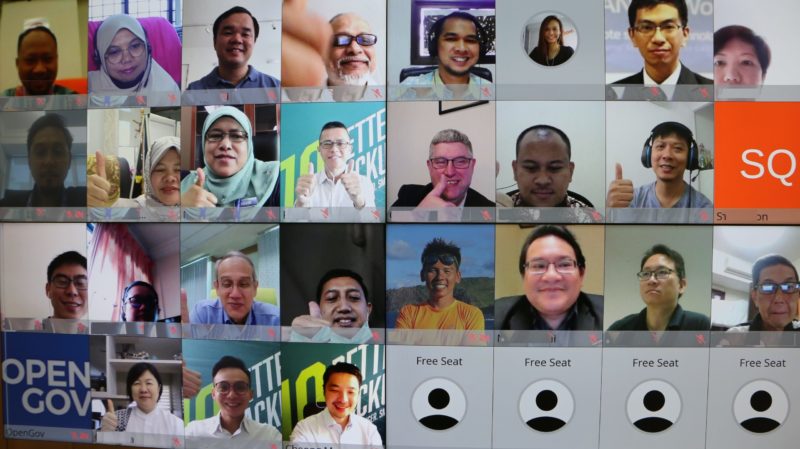
Governments are exceptional institutions that did not slow down during the pandemic. Although not all of their services were essential during the crisis, some were in high demand by default.
All over the world, governments are packed with great volumes of data that is hard to make sense of in their current setting. Primarily because it is unstructured but also because much is on legacy systems that are not accessible or compatible to modern infrastructure.
Merely hoarding data is not useful nor valuable. Data needs to be organised, analysed and should make sense if crucial decisions are based on it.
In light of this, OpenGov Asia held another Virtual Breakfast Insight: High-performance Digital Government – Intelligent Cloud Data Management Strategies on 25 June 2020.
The high-level session had a cross section of chief information officers and IT heads from various government and public sector organisations in Singapore, Malaysia and India. All joined in to discuss Simple, Scalable and Seamless Cloud Data Management for a high-performance digital government.

Mohit Sagar, Group Managing Director and Editor- in-chief at OpenGov Asia opened the session with thought-provoking insights into Cloud Data Management.
Mohit explained that data management is a process that might look like a herculean task especially in such a busy time for the government. Breaking it down in smaller bits makes it easier to implement and practice.
He advised the delegates to set manageable goals for future and focus on those rather than trying fix the mountains of unstructured data from the past.
And this is where cloud becomes relevant. It offers a simple, seamless, and scalable solution to data storage problems.
Organisations no longer have to worry about the location of valuable data in physical data centres. Cloud enables accessing data from multiple points remotely.
However, enabling remote access to data from multiple points has not been the natural structure of government organisations. It was necessitated by the pandemic.
Mohit also cautioned the audience that security of data in cloud is very important otherwise the data is prone to breaches and misuse.
He concluded by saying that government institutions should be open to adopting new technology as it will help them become more efficient and effective in serving public.

Raymond Goh, Director of Systems Engineering, Veeam shared his view that all organisations, be it public or private, are gradually getting more inclined towards a customer/citizen centric approach in their operations. Their data management strategies are also in line with that.
Keeping data classified is highly important for the organisations otherwise it can create impediments in growth and make data complex. It can also make compliance and security hard to achieve.
Apart from making operations difficult, unmanaged data can incur unnecessary costs for the organisations and loss of customer confidence.
Raymond shared key points in the process of cloud data management from ensuring backup and recovery to the last important bit about compliance with regulations.
He then moved to articulate state the three critical aspects for organisations to focus on in their cloud data management journey:
- Digital transformation and cloud data management to go hand in hand
- Have parameters in place to measure the success rate of managing data
- The 4 C’s to enable effective data management: Cloud, Capabilities, Culture, and Confidence

Having understood the importance of Data Management in cloud, Chris Buxton, Chief Digital Officer at Stats New Zealand threw light on how management of data over the cloud can be more effective than the traditional approach to storing data.
He shared some useful insights from his experience of rapidly transitioning to a cloud-based environment.
Chris believes that managing data on cloud is not very different from the traditional way of managing data.
Additionally, it opens a new range of capability and connectedness that is not available in the old way.
In this age of technology, data is are no longer being generated manually; technology is being leveraged to collect and harvest the data from the web. This, in turn, makes collaboration and storage easier.
Conversely at the same time, huge amounts of data are being ingested – making it crucial to ensure that all the data and content all secure. As such, data security becomes an integral part of Cloud data management.
Chris re-emphasised five key areas that were highlighted by Raymond earlier: security, compliance, cost management, automation, performance and monitoring.
Chris concluded by sharing the various steps to be undertaken as organisations begin their journey towards cloud data management.
He completed the circle beginning from having a plan to governing your data.
After Chris’s presentation the session went into a more interactive phase with polling questions for the attendees.
On the first question on how long an IT outage lasts in their organisations, delegates were divided between less than 15 mins (36%) and 16 – 60 mins (26%).
An IT executive from Malaysia shared that she voted for 1- 4 hours as the average time. She opined that the duration varies and is dependent on how critical the application in question is.
Her opinion was totally in line with the findings that Raymond shared from the recent survey conducted by Veeam. On average, in most organisations, IT outage does not last more than 2 hours.
Moving forward, the next question was about the primary reasons for IT outages in an organisation. On this majority of the audience voted for Infrastructure and networking (60%).
A senior executive from insurance sector shared that they faced several IT outages when their organisation moved to a remote working model. With a staff of 3000 employees, working remotely put a lot of pressure on their networks and infrastructure.
Raymond concurred with him as the Veaam survey also showed infrastructure failure as the major reason for outages besides cybersecurity threats and application software failures.
On the final question about why digital transformation is important for an organisation, the participants, for the most part, leaned towards transforming business operations and processes (50%) and transforming customer services (35%).
A delegate from India shared that transforming business processes is definitely the primary driving force behind digital transformation. However, it is still important to be mindful of the limitations of budgets.
The survey reflected similar trends with transforming customer services to be the top motivation for digital transformation followed by transforming business processes.
The interactive Q&A session offered a plethora of reflections and insights from delegates. This rich dialogue was extremely beneficial. It allowed the participants to understand cloud data management from diverse perspectives that were set in a range of contexts and settings.
Raymond concluded the session by urging organisations to take the next step in their digital transformation journey and urged them to work towards the four C’s he mentioned in his presentation.
Delegates of OpenGov Asia’s Virtual Breakfast Insight gained key insights from the digital experts who presented. They were left better informed by the diverse perspectives of each other on digital transformation and using cloud technologies to manage their data.

















